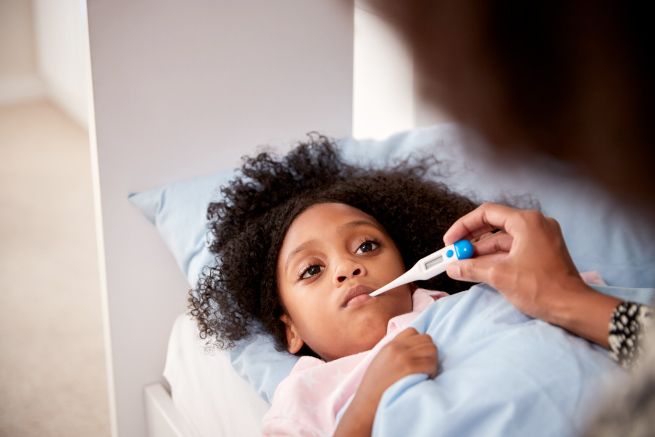Flu (Influenza) in Children & Babies
Flu in children, babies and toddlers can be tough on you and your little one. We’ll look at ways to help you make your little one feel more comfortable, relieve flu symptoms and get them back to their best.
This page was last reviewed 2020 by qualified paediatric nurse Dawn Kelly, a health visitor, lecturer and mother-of-three. Dawn was paid for her time and does not endorse CALPOL® Products.

What is flu?
The flu – or influenza - is a highly contagious virus infecting various parts of the respiratory system. It tends to appear most often during the winter months, with spikes in cases between December and March.
Influenza strains differ each year, which means how it might affect your little one can differ, too – from them feeling like they have a very bad cold, to more serious and complicated symptoms that could require a visit to the hospital. If you’re worried they have the flu, contact NHS 111
Flu symptoms
Flu symptoms in children and babies can appear similar to colds at first, but can quickly develop into more obvious flu-like symptoms. The first symptoms of influenza usually appear within two days of your little one becoming infected.
Typical signs of the flu in children can include:
Sudden fever – check to see if your child has a temperature of 38°C or above
Aching
Being tired or exhausted
Headaches
Finding it hard to sleep
Loss of appetite
Diarrhoea or sore tummies
Being sick – sometimes they will vomit, other times they just might feel nauseous
While children and babies show many of the same symptoms as adults when they catch the flu, there are two flu symptoms that younger children can be more prone to:
Being less active
Dawn Kelly says: “It’s worth remembering that not all children will have all these symptoms, and they might struggle to tell you exactly what they’re feeling. With babies, it’s best to look for symptoms that you can measure, like temperature.”
This content was written by healthcare professional Dawn Kelly in 2020. She was paid for her time but does not endorse CALPOL® Products.
How do you know if your little one has a cold or flu?
At first, it can be hard to tell the difference between the flu and the common cold, especially if your youngster hasn’t started talking.
Simple signs that could help you work out if they have a cold or flu are:
Cold symptoms come on more slowly than flu symptoms in babies and children
Flu affects more than just the nose and throat areas
Flu makes children feel exhausted and too unwell to carry on as normal
How long does flu last in children and babies?
Usually, your little ones will be good to go back to nursery or school a week or so after the first flu symptoms appear, although some babies feel tired and achy for longer .
When to contact NHS 111
The NHS now requests that people use the 111 online service initially (https://111.nhs.uk/) and only call 111 if they cannot get help online or you need help for a child under 5.
Get advice from 111 now if:
You're worried about your baby's or child's symptoms
Your child's symptoms do not improve after 7 days
Your child has a long term medical condition
Your child has a weakened immune system
Call 999 or go to A&E if your child:
Develops sudden chest pain
Has difficulty breathing
Starts coughing up blood
How to help prevent flu from spreading
While there’s no cure, there are ways people can help reduce the spread of the flu, which is especially important if you have a large family. This can be through learning simple handwashing techniques to knowing how it’s spread.
How is the flu spread?
The flu virus is usually spread when people cough and sneeze, sending tiny droplets of the virus into the air. These germs either travel directly to another person or land on surfaces, where they can live for up to 24 hours.
This means people tend to catch the flu when they’ve been in contact with others who have it or have touched surfaces that have the virus on them. In places like nurseries and schools flu can spread quite quickly.
Dawn says: “While people are more susceptible to the flu as they get older, it doesn’t mean that children can’t catch it.”
This content was written by healthcare professional Dawn Kelly in 2020. She was paid for her time but does not endorse CALPOL® Products.
Is the flu contagious?
Yes, the flu is highly contagious with the most infectious period within the first five days of someone having the flu.
The flu’s incubation period – the time between catching the flu and the first symptoms appearing - is usually around 48 hours.
How to reduce the spread of the flu
With children, it can be hard to prevent the spread of flu as they like to explore and touch things. However, you can teach them a few flu prevention rules to reduce the spread:
Wash hands with warm water and soap
Use tissues when coughing and sneezing
Bin tissues straight after use
If your baby has flu symptoms and is attending nursery, it’s best to keep them home. Likewise, for school-age children, keeping them away from the classroom will reduce the chances of it spreading.
Children can also get a flu vaccine for free through the NHS under certain conditions, for example if they are aged 2-3 years or when they are in primary school. To find out if your child is eligible for the flu vaccine, visit the NHS Flu Vaccine page
How to treat the flu
When you’re trying to get rid of the flu, what you’re really doing is treating the symptoms. There’s no cure – all you can do to help is use home flu remedies and medicines to help make your little one more comfortable.
Foods for flu
Many children will feel off their food when sick with the flu, but it’s worth trying to get them to eat some small meals to keep their energy up.
For older children, chicken soup can be very comforting. It’s a tasty way to help make sure they get enough fluids.
Medicines to treat fever and aches & pains
Medicines containing paracetamol or ibuprofen can help relieve your children’s fever or treat aches & pains to help them feel more comfortable - although you should be careful not to use them at the same time.
Discover the full range of Calpol products to help treat your child’s symptoms.
Always read the guidance on any medicine before giving it to children. Many are not suitable for children under two months, while doses can differ for different age groups. We can help you find the correct dosage for your little one.
Last reviewed 2020 by qualified paediatric nurse Dawn Kelly, a health visitor, lecturer and mother-of-three. Dawn was paid for her time and does not endorse CALPOL® Products.
Try following our five top tips for fighting the flu, as having the right information could make it an easier battle.
Let them sleep - make sure your child gets plenty of restful sleep. Don’t be afraid of letting them sit on the sofa with the TV on if that’s what they want.
Try and feed them – this can help them keep energy levels up; but don’t worry if they don’t want to eat as your child might lose their appetite for a few days.
Keep them hydrated - if your child has started eating solid food, offer lots of cool drinks, especially water. If they’re still on the breast or bottle, offer feeds more frequently.
Give them cuddles and support – they’ll feel rotten and will need your care and attention.
If they have fever for more than 48 hours, call your GP.

Corona Virus
At the moment it can be hard to know what to do if your child is unwell. It's important to trust your instincts and get medical help if you need it. If you think your child may be suffering from COVID-19 symptoms, visit the NHS website for further information.

Health Visitor
Dawn Kelly
Dawn is a qualified paediatric nurse, health visitor and lecturer with over 25 years’ experience. She’s written widely about child health and development and has a wealth of knowledge about childhood illnesses and advising parents on issues such as weaning and sleep. Her three daughters also put her knowledge to the test! This HCP does not endorse Calpol.